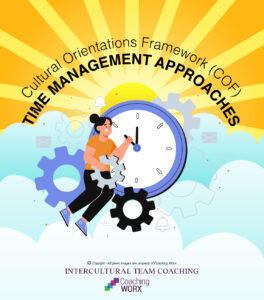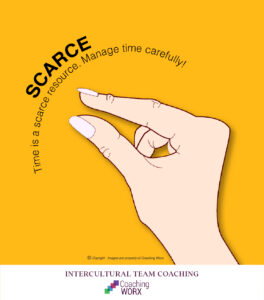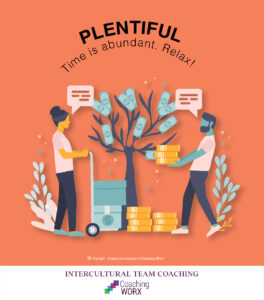INTERCULTURAL TEAM COACHING
Using the COF™ Assessment
“Coaching Across Cultures” a ground breaking book by Professor Philippe Rosinski. The book explores the challenges and opportunities of coaching individuals across different cultural backgrounds.

His book focuses on developing a cultural awareness and competence among coaches, which is critical for effective coaching across cultures. It introduces a “Cultural Orientations Framework COF™,” which identifies seven (7) different categories with seventeen (17) categories of cultural approaches that impact coaching. The “Cultural Orientations Framework COF™” Assessment is a valuable tool for organizations that are committed to sustaining a sustainable Diversity, Equity, Inclusion &Justice Programs.
Today, I am sharing the Second Category – “Time Management Approaches” with the dimension of “Scarce/Plentiful” in the “Cultural Orientations Framework COF™.
Scarce/Plentiful describes a Time Management Orientation that is Scarce or Plentiful. These dimensions can apply to any cultural context and is related to how individuals perceive and value time. The pendulum swings from one end to the other, and need not be an either/or.


Scarce Time Management: In a context where an individual’s orientation towards managing time is scarce, they tend to be highly focused on productivity and efficiency. They may prioritize completing tasks quickly and meeting deadlines, and may feel pressure to constantly work and avoid wasting time.
Plentiful Time Management: In a context where an individual’s orientation towards time is plentiful, they tend to have a more relaxed approach to time management. They may prioritize leisure activities, relationships, and personal growth over productivity and efficiency. They may also be less concerned with strict schedules and deadlines.
In a team where individuals have different orientations towards time regardless of their backgrounds much conflict may arise due to a lack of understanding of each others orientation. The Benefit of the COF™ Assessment is that it will create an awareness of our individual and team approaches to managing time and facilitates finding the balance so that with understanding we create a conducive workplace where everyone is included and feels a greater sense of belonging regardless of explicit differences.
To learn more, you may visit COFassessment.com. If you or your organization is interested in a COF™ Assessment you may contact me at [email protected].
Source: “Coaching Across Cultures” Philippe Rosinski.

